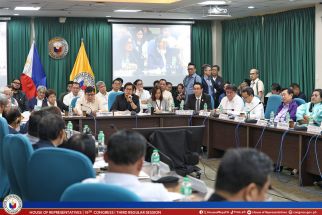Comelec flip-flops on Internet voting
February 21, 2007 | 12:00am
The Commission on Elections (Comelec) flip-flopped on its earlier decision favoring Internet voting, citing legal questions over implementation.
Comelec Commissioner Florentino Tuason told the Senate hearing yesterday that the poll body is likely to implement a "non-binding" scheme of voting over the Internet to allow overseas Filipino voters in Singapore to cast their votes in the May 14 elections.
Tuason, chairman of the Comelec’s Committee on Overseas Absentee Voting (COAV) told the Joint Congressional Oversight Committee on Absentee Voting at the Senate that the poll body will more likely honor voting through mail.
"It could be by mail and the Internet," Tuason said, adding the cyberspace voting will be allowed only "just to test the process."
Tuason stressed they are avoiding a possible lawsuit that may arise on legal questions concerning absentee voting procedures.
This in effect will disenfranchise some 26,000 absentee voters in Singapore, where they plan to implement voting over the Internet, he said.
Tuason said he would bring all the legal issues on its implementation before an en banc session of Comelec for a resolution over the issue.
He stressed before the lawmakers though the absence of a law regulating Internet voting or declaring the voting scheme illegal.
Sen. Richard Gordon, chairman of the Senate committee on laws and constitutional reforms, earlier questioned the legality of implementing Internet voting, which he said is not specifically provided for by present election laws.
Gordon stressed Internet voting should be regulated and should undergo a bidding process.
Tuason explained they were prompted to decide earlier to use the Internet for absentee voters and address several concerns such as the distance of voters from polling places and the lengthy process of counting votes.
Comelec Commissioner Florentino Tuason told the Senate hearing yesterday that the poll body is likely to implement a "non-binding" scheme of voting over the Internet to allow overseas Filipino voters in Singapore to cast their votes in the May 14 elections.
Tuason, chairman of the Comelec’s Committee on Overseas Absentee Voting (COAV) told the Joint Congressional Oversight Committee on Absentee Voting at the Senate that the poll body will more likely honor voting through mail.
"It could be by mail and the Internet," Tuason said, adding the cyberspace voting will be allowed only "just to test the process."
Tuason stressed they are avoiding a possible lawsuit that may arise on legal questions concerning absentee voting procedures.
This in effect will disenfranchise some 26,000 absentee voters in Singapore, where they plan to implement voting over the Internet, he said.
Tuason said he would bring all the legal issues on its implementation before an en banc session of Comelec for a resolution over the issue.
He stressed before the lawmakers though the absence of a law regulating Internet voting or declaring the voting scheme illegal.
Sen. Richard Gordon, chairman of the Senate committee on laws and constitutional reforms, earlier questioned the legality of implementing Internet voting, which he said is not specifically provided for by present election laws.
Gordon stressed Internet voting should be regulated and should undergo a bidding process.
Tuason explained they were prompted to decide earlier to use the Internet for absentee voters and address several concerns such as the distance of voters from polling places and the lengthy process of counting votes.
BrandSpace Articles
<
>
- Latest
- Trending
Trending
Latest
Trending
Latest
Recommended



























